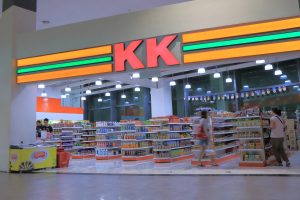A third branch of a popular Malaysian convenience store has been attacked with a Molotov cocktail for selling socks with the word “Allah” printed on them, a scandal that has led to two of the chain’s executives being charged with “hurting religious feelings.”
The latest attack on a KK Mart outlet took place in Kuching, in Sarawak state, Ahsmon Bajah, on Saturday, the district police assistant commissioner confirmed in a statement quoted by local media reports.
“In the incident, a carton of drinking water placed in front of the mart was set ablaze after the Molotov attack,” Ahsmon said in the statement. “The police are actively tracking the suspect and the case is being investigated under Section 435 of the Penal Code,” he added, referencing an article that outlaws arson and the use of explosives.
Outrage flared across Malaysian social media late last month when pictures of socks with the word “Allah,” the Arabic word for God, began being sold at KK Mart, the country’s second-largest mini-market chain. This went down very poorly among a vocal minority of Malaysian Muslims, who have viewed the association of the holy word with feet as a grave insult. The fact that KK Mart is a Malaysian-Chinese-owned company, and that the socks went on sale during the holy fasting month of Ramadan, have only added to the controversy.
The attack in Kuching was the third such assault on a KK Mart outlet, after a petrol bomb was thrown into another store in Perak state on March 26, and a Molotov cocktail was tossed into a branch in the eastern state of Pahang on March 30.
KK Mart quickly apologized for the socks, saying that it took the matter seriously and had taken immediate action to stop their sale. It also sued Xin Jian Chang, the supplier of the socks, alleging sabotage and damage to its brand reputation. The supplier in turn claimed that the “problematic socks were part of a larger shipment of 18,800 pairs ordered” from a company based in China.
This did not stop the Malaysian authorities, concerned about an outbreak of sectarian tensions, from charging Chai Kee Kan, the founder and chairman of KK Mart, and his wife Loh Siew Mui, a company director, with two counts of “wounding the religious feelings of others,” along with three representatives of its supplier, state news agency Bernama reported. All pleaded not guilty.
The incident and ensuing freak-out, which recalled a recent controversy about the logo on a pair of Nike sneakers, speaks to the unsettled nature of ethnic relations in Malaysia. The country’s Malay majority coexists with large Chinese and Indian minorities whose ancestors came to the country during the colonial era, and make up around 21 percent and 6 percent of the population, respectively. It also reflects the increasingly touchy and exclusive nature of Malaysian Islam, whose right-wing has had at least some success in advancing an idea of Malaysian identity that is framed in explicitly Islamic and Malay terms.
As a result of current and past tensions, the Malaysian authorities are sensitive to any express smacks of the so-called “3Rs”: race, religion, and royalty. In a statement released in the early stages of the controversy, the Department of Islamic Development (Jakim), said that the issue had “the potential to undermine social harmony in the country.” It added, “Jakim warns all entrepreneurs, manufacturers, suppliers, and importers always to be mindful and give serious attention to sensitive issues involving religion and ethnicity to maintain the harmony and well-being of the people in this country.”

































